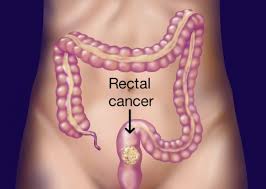Rectal Cancer Causes, Symptoms, Diagnosis and Treatment

What Is Rectal Cancer?
Also known as colorectal or colon cancer, rectal cancer is the development of cancer in the colon or rectum, which are parts of the larger intestine.
It generally begins as a benign tumor, usually in the form of a polyp, which over the course of time becomes cancerous.
Rectal cancer may be diagnosed by obtaining a sample of the colon during a sigmoidoscopy or colonoscopy and may be treated differently as per different stages require. The earlier it is diagnosed, the earlier are the chances of survival.
Cancers that are confined within the wall of the colon may be curable with surgery while cancer that has spread widely is usually not curable.
Globally, it is the third most common type of cancer making up about 10% of all cases. It is more common in developed countries, where more than 65% of cases are found.
Causes Of Rectal Cancer:
The exact cause of rectal cancer is not fully understood.
However, it follows the same prognosis as other forms of cancers. A genetic mutation in a DNA results in uncontrollable division of cells present in the lining of the rectum and colon. This leads to the formation of tumors which then may spread to other parts of the body.
Factors which may increase the risk of developing rectal cancer include:
- Older age- those above 60 are at a higher risk of developing rectal cancer
- Smoking
- Alcohol consumption
- Inherited genetic disorders
- Lack of physical activity
- Improper diet- a diet high in red, processed meat and low in fiber
- Family history of colon polyps
- Exposure to radiation
- Inflammatory bowel disease
Crohn’s disease
Ulcerative colitis - Inherited genetic disorders
Familial adenomatous polyposis
Hereditary non-polyposis colon cancer
Symptoms Of Rectal Cancer:
The following signs and symptoms may be exhibited:
- Diarrhea
- Constipation
- Not being able to completely empty the bowel
- Change in the size or shape of stools (narrower than usual)
- Bloody stool (either bright red or very dark)
- Pain in the rectum
- Abdominal pain or discomfort
- More frequent gas pains or stomach cramps
- Feeling bloated or full
- Change in appetite
- Unintended weight loss
- Fatigue or tiredness
Diagnosis Of Rectal Cancer:
Rectal cancer can be diagnosed via the following:
- Medical history and physical exam
- Digital rectal exam
- Colonoscopy
- Biopsy
Reverse-transcription polymerase chain reaction (RT-PCR) test
Immunohistochemistry - Carcinoembryonic antigen (CEA) assay
Treatment Of Rectal Cancer:
The following treatment options are available:
- Surgery
- Radiation therapy
- Chemotherapy
- Targeted therapy
- Clinical trials
Related Articles:
Esophageal Cancer Causes, Symptoms, Diagnosis and Treatment
Thyroid Cancer Causes, Symptoms, Diagnosis and Treatment
Vaginal Cancer Causes, Symptoms, Diagnosis and Treatment
Testicular Cancer Causes, Symptoms, Diagnosis and Treatment
Vulvar Cancer Causes, Symptoms, Diagnosis and Treatment
Gallbladder Cancer Causes, Symptoms, Diagnosis and Treatment
Pancreatic Cancer Causes, Symptoms, Diagnosis and Treatment
Case Seeking Cancer Screenings Heads To Trial
Solid Organ Transplant Patients At Higher Cancer Death Risk
A Sort Of Prostate Cancer Treatment May Upsurge Probabilities Of Alzheimer’s
Oral Cancer Causes, Symptoms, Diagnosis and Treatment
Ovarian Cancer Causes, Symptoms, Diagnosis and Treatment
Alkaline Diet Helping In Cancer and Other Syndromes
By : Natural Health News




